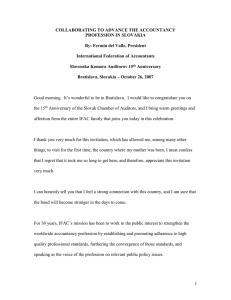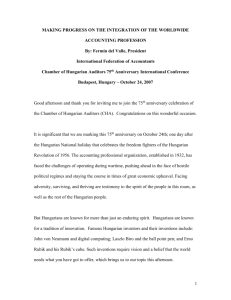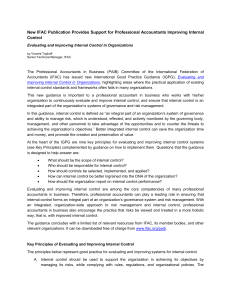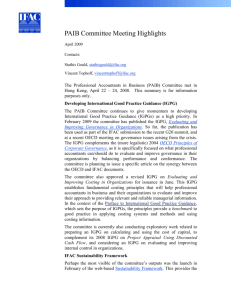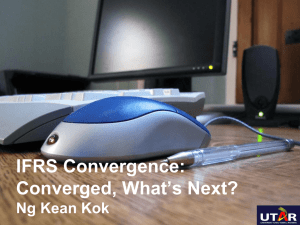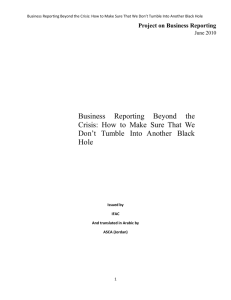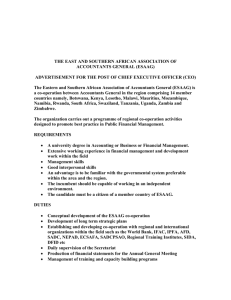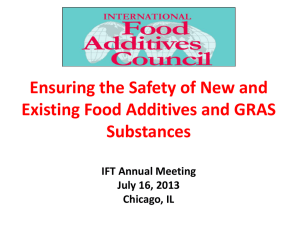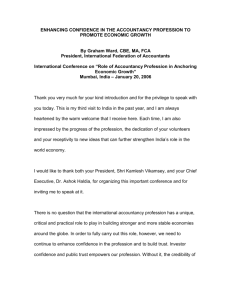The Institute of Chartered Accountants of India is a founding
advertisement
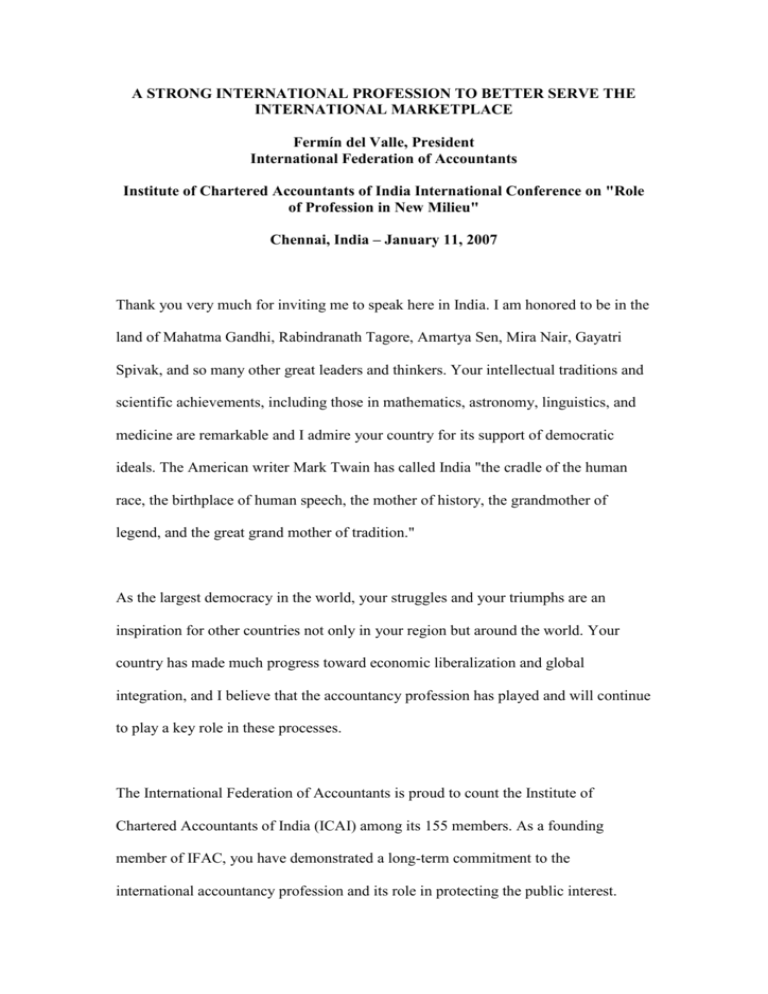
A STRONG INTERNATIONAL PROFESSION TO BETTER SERVE THE INTERNATIONAL MARKETPLACE Fermín del Valle, President International Federation of Accountants Institute of Chartered Accountants of India International Conference on "Role of Profession in New Milieu" Chennai, India – January 11, 2007 Thank you very much for inviting me to speak here in India. I am honored to be in the land of Mahatma Gandhi, Rabindranath Tagore, Amartya Sen, Mira Nair, Gayatri Spivak, and so many other great leaders and thinkers. Your intellectual traditions and scientific achievements, including those in mathematics, astronomy, linguistics, and medicine are remarkable and I admire your country for its support of democratic ideals. The American writer Mark Twain has called India "the cradle of the human race, the birthplace of human speech, the mother of history, the grandmother of legend, and the great grand mother of tradition." As the largest democracy in the world, your struggles and your triumphs are an inspiration for other countries not only in your region but around the world. Your country has made much progress toward economic liberalization and global integration, and I believe that the accountancy profession has played and will continue to play a key role in these processes. The International Federation of Accountants is proud to count the Institute of Chartered Accountants of India (ICAI) among its 155 members. As a founding member of IFAC, you have demonstrated a long-term commitment to the international accountancy profession and its role in protecting the public interest. We are very grateful for the talented leaders from India who have contributed so much to IFAC and continue to do so. Your current president T. N. Manoharan is a member of the International Accounting Education Standards Board and your past president, Kamlesh Vikamsey, is currently a member of the IFAC Board. We very much value the contributions of Kamlesh and that of Ashok Haldia, who serves as his technical advisor, to the IFAC Board. We also are grateful for the participation of five other members of the ICAI on key IFAC committees, including the Small and Medium Practices Committee, the Developing Nations Committee, the International Public Sector Accounting Standards Board, the Professional Accountants in Business Committee, and IFAC’s Compliance Advisory Panel. I extend my personal thanks to all of these individuals who make important contributions to IFAC’s work program and to the leadership of the ICAI who supports them in these endeavors. I would also like to congratulate the Institute of Chartered Accountants of India for defining itself as a “Partner in Nation Building” and, of course, my congratulations extend to every one of the professionals who work in and are members of this institution. This theme that you have chosen for your magazine summarizes perfectly the mission of the accountancy profession and the role of accountancy professionals: to collaborate – with each other, with other professionals, and with the communities of which we are a part, to build a stronger and better society. 2 Our profession can and should have a meaningful role in the development of the societies in which it operates. This means we must have a role not only regarding economic growth and stability, but also with respect to driving social and cultural development. But allow me to make an observation. Without detracting from this very important priority, the accountancy profession in India should not be content with contributing to the building of the nation. India can and must be a partner in the development of the rest of the world. The accountancy profession in India is being called to have an important influence at an international level. You have already and must continue to lead by example. The accountancy profession in India must be conscious of its dynamic role, noteworthy growth and influential position so it can effectively carry out its responsibility of leading by example. It must also be aware of the need – indeed the necessity – of sharing its culture with the rest of the profession around the world. By so doing, you will enrich our profession. I am convinced that one of the keys to true and sustainable development of the profession worldwide is that we open our minds to learn from every culture. 3 This implies not only that we have the right attitudes and necessary channels to learn from one another so that every contribution can be taken into consideration, but also that each country and each region is both prepared and willing to make their distinct contributions. I urge the profession here in India to share its own culture with the rest of the worldwide profession and also to embrace the cultures of others and to seek new ways of strengthening the profession in India by examining those that have worked in other countries around the world. Let me turn now to one of IFAC’s principal issues: that is, achieving convergence. We are convinced that the use of commonly accepted international standards worldwide will contribute significantly to the proper functioning of the financial market and the capital market and, consequently, will improve a country’s economic growth and stability. This is a most important and, I believe, most achievable goal. The more quickly we move on this, the greater the chance for success. Our aspirations should be beyond the scope of equivalence and mutual recognition. I know this can be a controversial issue and that the first priority now could be to remove the need for reconciliations, but the objective of achieving full convergence should not be replaced. Of course, the attitudes of Europe and the US towards this issue will influence the positions of many other countries, but India’s attitude will have a decisive impact as well. For its part, the International Auditing and Assurance Standards Board (IAASB) has focused on enhancing the clarity of its standards in order to facilitate translation, adoption and adherence by professional accountants worldwide. 4 Based on input from both the profession and the public, it has moved forward rapidly in implementing the clarity conventions. As of December 2006, the IAASB has exposed six of its 11 ISAs currently under full revision drafted in accordance with its clarity conventions. It has also issued four exposure drafts of redrafted ISAs. The IAASB anticipates the issue of exposure drafts of the remaining ISAs by September 2007 and the completion of final ISAs by September 2008. The IFAC Member Body Compliance Program, in which the ICAI is an active participant, is directly related to IFAC’s goal of achieving convergence. This program supports the development of high quality auditing, accounting, ethical, educational and related quality assurance and disciplinary standards in IFAC member bodies throughout the world. The program is intended to guide accounting institutes in the full spectrum of their professional responsibilities, to demonstrate a shared commitment to our profession’s values of integrity, transparency and expertise. We know that India is committed both to these standards and to these values. Your participation in the Compliance Program has indicated that you have generally adopted standards as issued by IFAC and the International Accounting Standards Board (IASB) as national standards with very few modifications. This is indeed laudable and shows both great judgment and foresight as your country continues to advance its industries and economy. Now, I would like to urge you to continue your efforts to achieve full convergence with International Financial Reporting Standards. 5 I recognize that this is a substantial undertaking and wish your task force much luck and also fortitude as it seeks to develop a concept paper on this topic. I know that we all agree, as recently highlighted by your President in a news article, that full convergence is a desirable situation and that investors and users of financial statements would benefit greatly from harmony in accounting standards across the globe. I know, too, that AASB develops Auditing and Assurance Standards on the basis of ISAs and recognizes the value of continuing adoption of standards. I would also like to urge you to achieve full convergence with ISAs, in accordance with the IAASB policy statement, Modifications to International Standards of the International Auditing and Assurance Standards Board - A Guide for National Standard Setters that Adopt the IAASB's International Standards but Find It Necessary to Make Limited Modifications. This policy position sets out the IAASB’s views on what modifications a national standard setter may make to the ISAs while still asserting that the resulting national standards conform to the international standards. In the area of ethics, I appreciate that the ICAI is continuing to make strides in adopting the IFAC Code of Ethics and that, where there are differences, you are studying the need for revisions. I urge you to continue making this project a priority. IFAC’s International Ethics Standards Board for Accountants, which develops the Code of Ethics for Professional Accountants, periodically reviews the Code to ensure its relevancy both to the profession and to the public it represents. Just two weeks ago, it issued an exposure draft of a new independence standard. 6 I urge you to review this document which is posted on the IFAC website and to comment on it. In addition to promoting convergence to ethical, auditing and accounting standards, IFAC is dedicated to meeting the needs and representing the interests of small and medium enterprises (SMEs). Given the predominance of both SMEs and small and medium practices (SMPs) here in India, I would like to take a few moments now to explain what this strategy means in terms of IFAC actions and initiatives. First, IFAC is focused on improving the applicability of accounting and auditing standards to the SME marketplace. We accomplish this in several ways. First and foremost, we attempt to gain a better understanding of the unique needs and challenges to SMEs through research, public forums, and ongoing dialogue with those who also serve this constituency. For example, IFAC hosts an annual SMP/SME forum at which it obtains grass roots input on the specific interests of this constituency and meets with other international leaders to determine appropriate solutions. This aspect of debate and dialogue is crucial to the work of the IFAC Small and Medium Practices Committee. Secondly, the SMP committee provides ongoing input to the IAASB as it develops and updates International Standards on Auditing (ISAs) and actively monitors and comments on the work of the IASB, and most especially, its proposed approach to develop an International Financial Reporting Standard tailored to meet the needs of – and intended for use only by – small and medium-sized entities. 7 IFAC wholeheartedly supports the approach proposed whereby IFRSs are the starting point for developing SME standards. Thirdly, IFAC is focused on providing practical assistance to SMEs on implementing international standards. We have commissioned the Canadian Institute of Chartered Accountants to develop an ISA implementation guide for SMEs. This new guide is expected to be completed by the end of the year. In addition, we recently completed an independent study of the needs of microentities, and we are now in the process of reviewing the findings of this study. Sylvie Voghel, Chair of IFAC’s SMP Committee, will be discussing the role of the committee and its specific projects in more detail at tomorrow’s conference. My comments today are designed to emphasize IFAC’s role in clearly defining the issues faced by SMEs, particularly with respect to the implementation of international standards. During today’s conference, you will also hear from IFAC Chief Executive Ian Ball about the development of International Public Sector Accounting Standards and their role in strengthening governance in the public sector. Time does not permit me to discuss IFAC’s many other activities, including its expanding work for professional accountants in business and its new KnowledgeNet, in which India participates with over a dozen other member bodies in sharing global resources. 8 Thank you very much for your warm reception and attention. I look forward to working with the ICAI during my term as IFAC President as we strive to continually strengthen this great profession of ours. Thank you. 9
